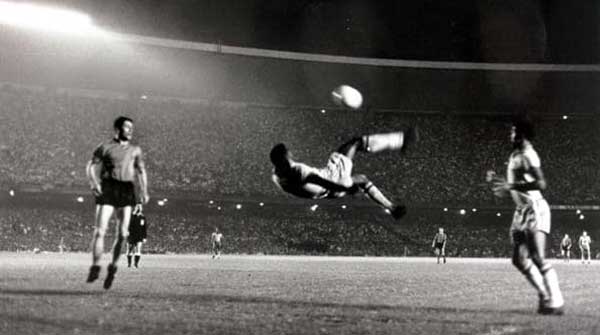After the 1958 World Cup, international football suddenly had a new superstar
 Albeit in a sad way, it’s perhaps appropriate that news of Pelé’s declining health coincides with the World Cup. The tournament was, after all, the stage where he first came to international attention back in 1958. He was 17 at the time.
Albeit in a sad way, it’s perhaps appropriate that news of Pelé’s declining health coincides with the World Cup. The tournament was, after all, the stage where he first came to international attention back in 1958. He was 17 at the time.
Being a sports-mad Irish child then, the 1958 competition wasn’t the first I was aware of. Four years earlier, we’d all been sure that Hungary – dubbed the Mighty Magyars – would walk away with the trophy in Switzerland.
The Hungarians first appeared on our radar when they eviscerated England on the hallowed home turf of Wembley. The score was 6-3, a result and a margin that confounded all expectations. And to top it off, they played a new kind of fluid football that involved non-traditional formations, continual interchanging of positions and even a novel style of lightweight football boot.
 |
| Related Stories |
| Most of the criticism of Qatar World Cup is hypocritical
|
| Liverpool FC finally grabs Premier League title
|
| Ali a champion who sought to change the world |
Then they cruised through the early stages of the World Cup tournament before engaging in an ill-tempered quarter-final struggle with Brazil, an event that became infamous as the Battle of Berne. After the Hungarians triumphed 4-2, the unhappy Brazilians invaded their dressing room to recommence hostilities!
For the final, Hungary faced West Germany, a team they’d trounced 8-3 in the pre-knockout stage a couple of weeks earlier. We joked that it was hardly worth playing the game. But we were wrong. In one of the great sporting upsets, the Germans triumphed 3-2.
By the time 1958’s tournament in Sweden rolled around, the Germans were still powerful but the Hungarians had been depleted by the aftermath of the 1956 revolution. And the Republic of Ireland having failed to qualify, our sentimental allegiance was with Northern Ireland. However, we had no expectations of them. Nor was there any overwhelming favourite analogous to Hungary four years earlier.
Northern Ireland, it transpired, did surprisingly well, pluckily battling through to the quarter-finals. But the big story of the competition revolved around Brazil and Pelé. As his team more or less eased its way to the title, he scored six goals in four games. International football suddenly had a new superstar.
The way in which Pelé’s fame spread was seriously impressive.
While a number of games were televised, it was still a pre-television age for most people in the world I lived in. On my middle-class road in suburban Dublin, only a couple of houses had a TV (we, for instance, didn’t acquire a set until late 1961).
So, unless you happened to catch a clip in a cinema newsreel, Pelé’s magical moves were a product of your imagination. We’d never actually seen what we talked about.
In a way, that’s similar to reading a book rather than watching a movie. You take the narrative described by the written word and run it through the prism of your life experience to create a series of mental images. While not necessarily accurate, those images become vivid and real.
Pelé played in three further World Cups – 1962 in Chile, 1966 in England and 1970 in Mexico. They weren’t all happy experiences.
In Chile, he got injured in the second game and sat out the balance of the competition. Brazil won anyway.
England in 1966 was ugly. Roughed up by Bulgaria and Portugal, he played just two games and Brazil were eliminated before the knockout stage.
But his 1970 swansong was sweet. He featured in all six games as Brazil regained the title, scored four goals and was named the tournament’s most outstanding player. It was a perfect example of going out on top.
Pelé was what’s now called a striker, someone whose main function was to get goals. And scoring 77 times in 92 international appearances, he delivered in spades.
However, he was also very much a team player. A precise ball passer, he was adept at taking part in complicated moves and often set up scores for other players.
Placing Pelé in the pantheon of all-time football greats is a notional exercise. These sorts of assessments always are. But pretty much everyone believes he was one of the very best.
The late Bobby Moore, the man who captained England to its only World Cup title, had this to say: “Pelé was the most complete player I’ve ever seen; he had everything.” Another England great, Bobby Charlton, echoed the sentiment noting, “I sometimes feel as though football was invented for this magical player.”
All in all, not a bad epitaph!
Pat Murphy casts a history buff’s eye at the goings-on in our world. Never cynical – well, perhaps a little bit.
For interview requests, click here.
The opinions expressed by our columnists and contributors are theirs alone and do not inherently or expressly reflect the views of our publication.
© Troy Media
Troy Media is an editorial content provider to media outlets and its own hosted community news outlets across Canada.

